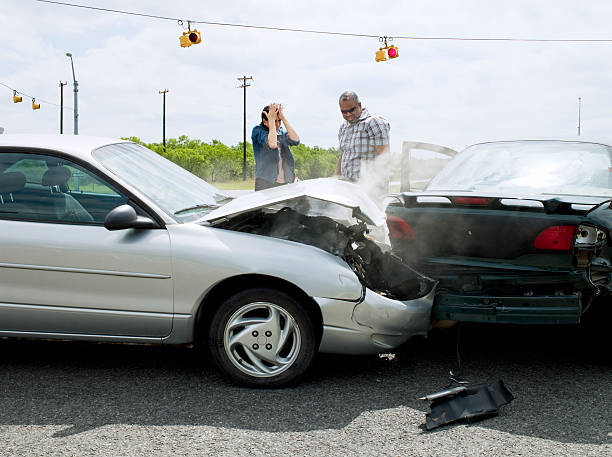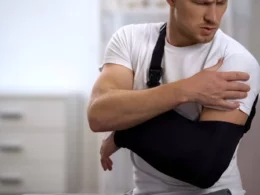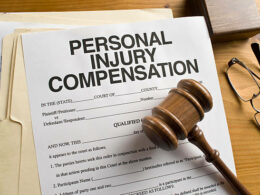Road traffic accidents can be a traumatic experience, and if you’re injured as a result, it’s essential to understand your rights and the steps to take in order to make a personal injury claim. The process of seeking compensation for your injuries can be complex, but with the right guidance, you’ll be in a better position to navigate through the legal system and obtain the assistance you need.
This article will provide you will all you need to know about road traffic accident personal injury claims.
What Are Road Traffic Personal Injury Claims
Definition and Types of Injuries
When you are involved in a road traffic accident, you might be eligible for personal injury claims. These claims can provide compensation for your medical expenses, lost wages, and other damages resulting from the accident.
Injuries from road traffic accidents can vary greatly, affecting drivers, passengers, pedestrians, and cyclists. Some common types of injuries include whiplash, fractures, cuts and bruises, and more serious injuries such as traumatic brain injuries or spinal cord damage.
Liability and Fault in Traffic Accidents
Determining liability and fault in traffic accidents is crucial for your personal injury claim. In general, the party who is found to be at fault is the one responsible for any damages caused to others. This may involve various factors such as:
- Failing to adhere to road rules and regulations.
- Driving under the influence of alcohol or drugs.
- Distracted driving, like texting and driving.
It’s important to gather evidence and proof in order to support your claim.
Negligence and Contributory Factors
Negligence is a key concept in personal injury claims, relating to the failure to exercise reasonable care while driving a vehicle. If you can prove that the other party’s negligence caused the accident, then you have a strong case for compensation.
However, keep in mind that contributory factors might affect your claim. If it’s found that you also contributed to the accident (e.g., not wearing a seatbelt, speeding, or using your phone while driving), your compensation might be reduced based on the percentage of your own negligence.
During the entire process, it’s advisable to seek legal advice and representation to guide you and ensure the best possible outcome for your road traffic personal injury claim.
Claim Process and Legal Representation
Initial Consultation
When dealing with a road traffic personal injury claim, it’s essential to start with an initial consultation. This is often a free consultation with an experienced attorney who can help assess the strength of your case. During this consultation, you should discuss the details of the accident, your injuries, and any financial losses you’ve experienced. In most cases, attorneys offer a free initial consultation to better understand your case and provide preliminary guidance.
Working with a Personal Injury Attorney
After the initial consultation, if you decide to move forward with your claim, you will work closely with a personal injury attorney. The attorney will analyze important evidence, such as accident reports, photographs, and medical documents, to build a strong case on your behalf. They will also handle communication with insurance companies and other parties involved in the incident. It’s crucial to select an experienced law firm that specializes in personal injury claims.
Filing a Lawsuit
If you cannot reach a settlement through negotiations, your attorney might recommend filing a lawsuit. This process begins with drafting and filing a complaint with the appropriate court. In California, for example, claims involving the California Department of Transportation (Caltrans) may be filed directly with Caltrans if the claim amount is $10,000 or less. Your attorney will be able to guide you through this process, ensuring that all necessary paperwork is completed and filed within the required deadlines.
Settlement Negotiations
Throughout the claim process, your attorney will engage in settlement negotiations with the opposing parties. Their goal is to reach a fair compensation for your injuries and damages without going to trial.
However, if a reasonable settlement cannot be reached, your attorney will be prepared to represent you in court and argue your case before a judge or jury. Remember, a skilled and experienced attorney can make all the difference during settlement negotiations.
By following these steps, you can navigate the claim process and legal representation for your road traffic personal injury case with greater confidence and understanding.
Available Compensation Types
In a road traffic personal injury claim, there are several types of compensation you may be entitled to. This section will discuss the various types of compensation you might receive, depending on the specifics of your case.
Medical Expenses
Medical expenses are a common type of compensation in personal injury claims. You may be reimbursed for expenses you’ve already incurred or for future medical care related to your injuries. This can include:
- Hospital bills
- Physical therapy
- Prescription medications
- Medical devices
It’s crucial to keep detailed records of your medical expenses to obtain fair compensation for your injuries.
Pain and Suffering
Pain and suffering compensation covers the physical and emotional distress you’ve experienced as a result of your accident. This type of compensation can vary depending on the severity of your injuries, the impact they have on your daily life, and sometimes on your region’s laws. Factors that may contribute to your pain and suffering compensation include:
- Severity of the injuries
- Length of time to recover
- Emotional trauma
Lost Wages and Property Damage
If your injuries prevent you from working, you may be compensated for lost wages. This will cover the income you’ve lost due to time off work or reduced work hours, as well as potential future earnings if your injuries affect your ability to work in the long term.
Property damage compensation, on the other hand, covers the cost of repairing or replacing your vehicle or any other personal property that was damaged in the accident.
Wrongful Death Compensation
In cases where the road traffic accident results in a fatality, the surviving family members may be entitled to wrongful death compensation. This type of compensation can cover medical expenses, funeral costs, loss of financial support, and emotional pain and suffering of the grieving family members.
Understanding the available compensation types and their potential impact on your personal injury claim can help you seek the justice and financial support you deserve after a road traffic accident.
Evidence and Investigation
Role of a Police Report
When involved in a road traffic personal injury claim, obtaining a police report plays a crucial role in your case. A police report provides an objective account of the accident, including details about the involved parties, contributing factors, and any citations issued. This document can be vital in establishing which party was at fault. Make sure to request a copy of the police report after the incident, as it can aid your investigation and strengthen your claim.
Gathering Evidence of Liability
To successfully prove liability, it’s essential to gather supporting evidence. Here are some steps you can take to collect relevant information:
- Photographs: Capture photos of the accident scene, vehicle damages, and any injuries sustained.
- Witness statements: Obtain contact information of witnesses and ask for their version of what happened.
- Surveillance footage: Check if nearby security cameras captured the accident.
- Accident reconstruction: In some cases, you might need a professional to recreate the accident using available data.
Demonstrating liability with strong evidence will increase your chances of achieving a favorable outcome for your claim.
Proving Medical Expenses
In addition to establishing liability, you need to provide medical evidence for your injury claim. Proving the extent and cost of your medical treatment is essential in getting the appropriate compensation for your recovery. Here’s what you need to do:
- Keep a record of medical bills: Maintain a file containing all your bills, invoices, and receipts related to the accident treatment.
- Obtain medical reports: Request copies of your medical records from healthcare providers, highlighting the direct connection between the accident and your injuries.
- Document your progress: Document your recovery process, including any ongoing treatments, physical therapy, and the impact of your injuries on your daily life.
By meticulously gathering and organizing the appropriate medical information, you can help support your claim and ensure a successful resolution.
Dealing with Insurance Companies
Communicating with Insurers
When dealing with insurance companies after a road traffic accident, it’s essential to keep clear and detailed communication. Notify your insurer as soon as possible and provide all necessary information, including the police report, witnesses, and other relevant details. Remember to be truthful and consistent with your statements, as inconsistencies may be used against you. Maintain records of all communications with insurance adjusters and any documents sent or received.
Determining Policy Limits
It is crucial to know the policy limits of both your insurance and the other party’s insurance. This information helps you understand the maximum amount you can recover from each insurer. Request a copy of the policy declarations page, which outlines the coverage limits, deductibles, and other important information. Keep in mind that you could potentially seek compensation from multiple insurance policies, depending on the circumstances of the accident.
Understanding Insurance Company Tactics
Insurance companies are profit-driven businesses, and they may employ certain tactics to minimize claim payouts. Be cautious when:
- Dealing with insurance adjusters: They may seem friendly, but their primary responsibility is to the insurance company. Avoid providing recorded statements without consulting a personal injury lawyer, as these can be used against you later.
- Reviewing settlement offers: Insurers may offer a quick and low settlement to minimize their expenses. Carefully assess any offers and consult legal advice before accepting.
- Providing personal information: Stick to the relevant information to avoid inadvertently disclosing information that could be used against your claim.
- Signing release forms: Some insurers may ask you to sign a release in exchange for a settlement. Understand that this may waive your right to pursue further compensation. Consult a lawyer before signing any documents.
By understanding these tactics, you can protect your rights and pursue the compensation you deserve after a road traffic personal injury.
Common Road Traffic Personal Injury Claim Scenarios
Car Accidents
Car accidents are a frequent source of personal injury claims. If you are involved in an accident and sustain injuries due to another driver’s negligence, you may be entitled to compensation. In cases where fault is clear, your claim may be straightforward. However, if both parties share responsibility for the accident, your settlement could be affected by contributory negligence principles.
Pedestrian Accidents
Pedestrian accidents can result in severe injuries, especially when a car or other vehicle is involved. As a pedestrian, you have the right to compensation if a driver’s negligence caused the accident. Keep in mind that your own actions, such as jaywalking or not using designated crossings, could impact your road traffic accident claim.
Cycling Accidents
Cycling accidents often involve collisions with motor vehicles, resulting in injuries to the cyclist. If you are injured as a cyclist due to a driver’s negligence, you may be eligible for compensation. Be aware that factors such as not wearing a helmet or not following traffic rules could affect your claim.
Motorcycle Accidents
Motorcycle accidents can lead to severe injuries, as motorcyclists are more vulnerable on the road. If you are a motorcyclist injured due to another driver’s negligence, you may have grounds for a personal injury claim. However, if you were driving without a valid license, exceeding speed limits, or not wearing a helmet, your compensation may be reduced.
Bus and Taxi Accidents
Bus and taxi accidents can involve multiple parties, making the claim process more complex. As a passenger in a bus or taxi, you have the right to seek compensation if you sustain injuries from an accident caused by driver negligence. Keep in mind that the motor insurers of the at-fault vehicle will likely be responsible for providing compensation in such cases.
Special Circumstances
Whiplash Injuries
Whiplash injuries are a common result of road traffic accidents, and they occur when your head is suddenly and forcefully jerked backward and forward. These injuries can range in severity, from mild discomfort to more serious issues requiring medical attention. If you’ve suffered a whiplash injury in an accident that wasn’t your fault, you may have grounds for a personal injury claim. Consult with a legal professional to help determine the best course of action for your specific case.
Hit and Run Accidents
Hit and run accidents can be particularly distressing. If you’ve been injured in a hit and run accident, the first thing you should do is report it to the police. In some jurisdictions, you may be eligible for compensation through an uninsured drivers’ fund that has been set up to help victims of hit and run accidents. Your personal injury claim process may vary compared to a standard accident, so consult with a legal expert to navigate through your situation.
Injuries to Children
Accidents involving injuries to children can be especially difficult to deal with. In some cases, a parent or legal guardian may need to act on behalf of the child to file a claim for compensation. Depending on the severity of the injury, a claim may cover expenses related to medical treatment, rehabilitation, and ongoing care, as well as any future loss of earnings due to the child’s injuries. It is important to speak with a legal professional to understand the nuances and complexities associated with personal injury claims involving children.
Time Limitations for Filing a Claim
In most personal injury cases, there is a time limit within which you must file a claim. This is often referred to as the statute of limitations. In many cases, the time limit for filing a claim after a road traffic accident is three years from the date of the accident. However, this may vary depending on the jurisdiction and specific circumstances. Serious injuries, such as brain injuries or broken bones, may also have different time limits associated with them. It’s crucial to consult with a legal expert to ensure you’re aware of any relevant time limitations and initiate your claim within the appropriate timeframe.
Seeking Recovery and Rehabilitation
Medical Treatment and Bills
After a road traffic personal injury, your priority should be to seek medical treatment for any sustained injuries. Make sure to keep detailed records of all medical treatments, including hospital bills, doctor visits, medications, and diagnostic tests. This documentation will be important when seeking compensation for your medical bills and other expenses related to your injury.
Some tips for handling medical bills during your recovery process include:
- Reviewing your bills carefully for accuracy
- Working with your health insurance company to maximize coverage
- Negotiating payment plans with healthcare providers if necessary
Rehabilitation Services
In addition to medical treatment, you may require rehabilitation services, such as physical therapy or occupational therapy. These services can help you regain lost function and adapt to any long-term or permanent limitations resulting from your injury. Like medical treatment, remember to keep detailed records of all rehabilitation services you receive and their associated costs, as these expenses can also be included in your personal injury claim.
To maximize your rehabilitation efforts, consider the following:
- Research and choose reputable rehabilitation providers
- Discuss expectations and goals with your therapists
- Consistently attend scheduled sessions and follow recommended home exercises
Psychological Support
Road traffic personal injuries can also have an emotional and psychological impact. You may experience feelings of anxiety, depression, or post-traumatic stress disorder (PTSD) following the accident. It’s important to seek psychological support to help you cope with the emotional challenges of your recovery journey.
Some options for psychological support include:
- Therapy or counseling, either individually or in a group setting
- Support groups for those who have experienced similar accidents or injuries
- Expanding your social network to include friends, family, or community members who can provide emotional support
Addressing both your physical and emotional needs during your recovery phase can alleviate some of the financial burdens associated with your injury. Consider engaging the services of attorneys with expertise in road traffic personal injury claims, as they can help you navigate the process of seeking compensation for your medical expenses, rehabilitation services, and psychological support needs, allowing you to focus on your healing and well-being.
Conclusion
In the aftermath of a road traffic accident, ensuring that you receive proper medical care is crucial. This not only addresses any immediate health concerns but also provides documentation to support your injury claim.
Once your physical wellbeing is taken care of, gathering evidence from the accident scene, such as photographs and witness statements, can strengthen your case. Consult with an experienced personal injury attorney who can help you determine the best course of action, filing an insurance claim, and assisting you throughout any legal proceedings that may arise.
Remember, the support of a skilled legal team is essential in navigating the complexities of road traffic personal injury claims.
It’s important to be aware that each claim is unique, and compensation can vary depending on several factors such as the severity of your injuries, the impact they have on your daily life, and the degree of responsibility of the other party involved in the accident.
Therefore, it’s essential to seek professional advice to ensure that your claim is tailored to your specific needs and that you receive the full compensation that you are entitled to.
YOU SHOULD ALSO READ:












